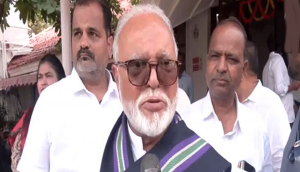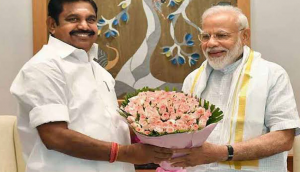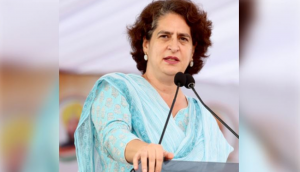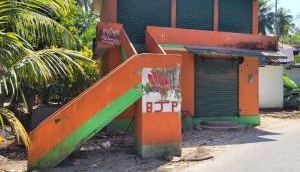JNUSU and DU elections: ABVP set for mixed fortunes in student polls

Two of the biggest central universities in the country - the Jawaharlal Nehru University (JNU) and the University of Delhi (DU) - went to the polls on Friday, 9 September.
The prospects for some of the biggest students' organisations are looking vastly different at the two varsities.
The RSS-affiliated Akhil Bhartiya Vidyarthi Parishad (ABVP) seems likely to score a hat-trick of wins in the DU Students' Union (DUSU) elections, but the right-wing party's chances seem slim against the Left union panel in the JNU Students' Union (JNUSU) polls.
The situation at JNU
At JNU, polling was held from 9.30 am to 1 pm and from 2.30 pm to 5.30 pm.
Two heavyweight Left groups - the All India Students' Association (AISA) and the Students' Federation of India (SFI) - have come together in the traditionally Left-dominated JNU. However, the Birsa Ambedkar Phule Students' Association (BAPSA), a newly-emergent political force on campus, is likely to give the Left a close fight for the post of president. BAPSA presidential candidate Rahul Punaram Sonpimple is pitted against Mohit Kumar Pandey of AISA-SFI.
Sources say the only shot the ABVP has at victory is for the post of general secretary, for which its candidate is Vijay Kumar. Last year, Saurabh Sharma was the only ABVP candidate to be elected to the union, after a gap of 14 years. He won the post of joint secretary. For president, the ABVP has put forward Janhawi Ojha.
The Congress-backed National Students' Union of India (NSUI) has fielded Sunny Dhiman for president, while Deelip Kumar is contesting for the top post from Students for Swaraj, backed by Yogendra Yadav's Swaraj Abhiyan.
The case of the 'anti-nationals'
In JNU, 16 of the 21 students who were found 'guilty' of flouting university norms in the 9 February 'sedition' incident by an internal inquiry committee were allowed to cast their votes.
They had earlier been barred from voting until they paid their fines, but their names were included in the voters' list, with the Delhi High Court ordering a stay on the punishments until the petition filed by the students is heard next.
Of the 21 students found guilty by university-appointed inquiry committee, one student - Anirban Bhattacharya, who was among the three arrested - has already completed his PhD, while two were not from JNU and two were not identified.
The All India Students' Federation (AISF) - the Left group that last year's controversial JNUSU president Kanhaiya Kumar belongs to - is not contesting this year, owing to internal differences with AISA-SFI, but has pledged outside support to the contesting Left panel.
Students' elections in JNU are fought not just on the immediate issues concerning the students on campus, but also on the wider political situation, especially after the 9 February controversy this year. Kanhaiya and two other students were arrested for allegedly shouting 'anti-national' slogans at an event organised on that day. Besides, the rape case against AISA activist Anmol Ratan by a PhD student at JNU has also been a talking point in this election.
This was also reflected in the JNUSU presidential debate that took place on Wednesday night, where the candidates for president from all groups appealed to the passions of a huge crowd of students. This debate has often been the deciding factor in past JNU elections.
The JNUSU results are likely to be declared by Monday, 12 September.
What's happening at DU?
Polling took place from 8.30 am to 12.30 pm for the morning colleges, and from 3 pm to 7 pm for the evening colleges.
DU has traditionally seen a contest between ABVP and the NSUI, but AISA has also recently emerged as a contender. However, neither the Left nor the centrist Congress seem to stand much of a chance against the ABVP, which has made a clean sweep of all four central panel posts in the past two elections.
ABVP activist Saket from DU said the group had been working for the students throughout the year, and was confident of winning all four seats again. NSUI activist Ameet Singh Teema said his organisation had a strong shot at the posts of president and joint secretary.
Meanwhile, Aman Nawaz of AISA said his group would likely clinch the positions of secretary and joint secretary in these DUSU elections.
The ABVP presidential candidate for DUSU this year is Amit Tanwar, while NSUI has fielded Nikhil Yadav and AISA has picked Kawalpreet Kaur for the post of president.
Low voter turnout
The voter turnout at DU was rather low this time, compared to previous years. Even with an electorate of 1,23,241 students across 51 colleges, the number of voters who turned up to cast their ballot is likely to be around 40,000, through the official figures will only be available by Saturday.
One of the reasons for the low turnout is that a number of colleges did not hold their college-level polls concurrently. It was considered unlikely that a large number of students would turn up only to vote for the DUSU elections.
For instance, Ramjas College has postponed its college-level polls due to a fight that took place between candidates. The Faculty of Law - which comprises the Campus Law Centre, Law Centre-1 and Law Centre-2 - is also not holding its elections because of the delayed admissions process. Other colleges not holding polls include Satyawati College (Evening), Bhaskaracharya College and Ramanujan College.
Another reason for the low turnout is that only students who had paid their fees by 31 August have been allowed to vote. But because of extended admissions at most colleges in the university, a large number of students did not match the criteria.
However, the university administration made sure the security was tight, with around 300 CRPF and Delhi Police personnel stationed at the North Campus of DU. Polling took place smoothly.
The DUSU results will be declared on Saturday, 10 September.
Edited by Shreyas Sharma
More in Catch
Prevent teachers from becoming businessmen, says Kanhaiya Kumar
Which part of JNUSU president Kanhaiya Kumar's speech is seditious?
Battle for #DUSU: Election in the times of social media
First published: 10 September 2016, 0:25 IST





![BJP's Kapil Mishra recreates Shankar Mahadevan’s ‘Breathless’ song to highlight Delhi pollution [WATCH] BJP's Kapil Mishra recreates Shankar Mahadevan’s ‘Breathless’ song to highlight Delhi pollution [WATCH]](https://images.catchnews.com/upload/2022/11/03/kapil-mishra_240884_300x172.png)

![Anupam Kher shares pictures of his toned body on 67th birthday [MUST SEE] Anupam Kher shares pictures of his toned body on 67th birthday [MUST SEE]](https://images.catchnews.com/upload/2022/03/07/Anupam_kher_231145_300x172.jpg)






